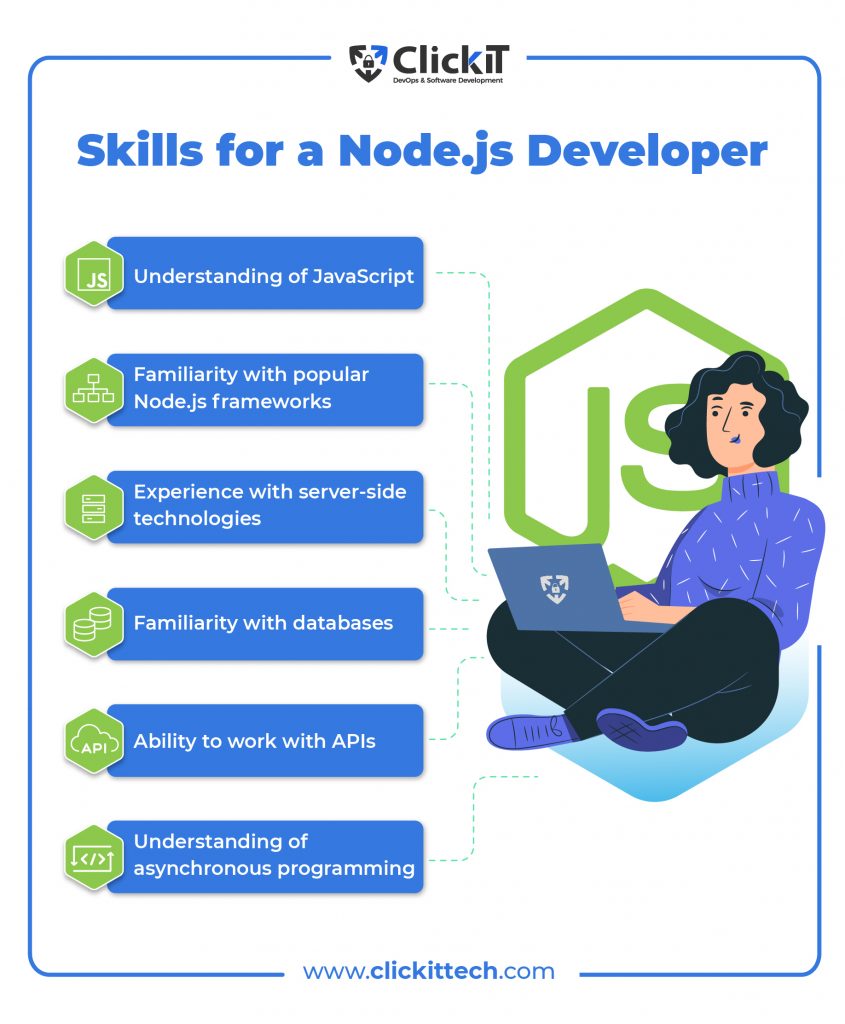Node.js is a widely used technology among developers and businesses worldwide, and to hire a Node.js developer, you need to look for some essential aspects. In this article, we will also discuss how to hire a Node.js programmers, what is needed to have successful Node.js development and more!
As a popular technology, hiring the best Node.js developers may not be as easy as you think. For example, there is a high demand for skilled Node.js programmers, and the competition is fierce; therefore, the Node.js developer’s salary is an important factor in this process.
There are also skillset requirements, including JavaScript proficiency, knowledge of asynchronous programming, understanding of back-end development, and experience with Node.js frameworks. These considerations can make it difficult to hire a Node.js programmer.
Not anymore.
Here’s a complete guide to hiring a Node.js programmer who can help you build a high-performance, efficient, and scalable application.
- Be Aware of the Cost of Hiring a Node.js Developer
- Where to Hire a Node.js Developer
- Best Practices to Interview Node. js Candidates
- What is Next for my Node js Developer? Task Assignment
- Conclusion

Be Aware of the Cost of Hiring a Node.js Developer
The cost to hiring a for Node.js programmer will depend on various factors like location, project complexity, developer experience and skill level, and the development company’s employment model.
According to Upwork, the average salary of a Node.js developer is between $18-38/hr. However, this cost could rise to $100 or more depending on the project scope, development experience (for senior developers), location, and whether it’s an independent contractor or agency.
According to ZipRecruiter, Talent.com, and Glassdoor, the following are the average salary of Node.js developer depending on location:
- United States of America: $70,000 to $180,000
- Canada: c$111,000
- Mexico: MXN 41,000-85,000/month
- United Kingdom: £60,000
- Australia: AUD 115,000
- India: ₹4,99,895

Where to Hire a Node.js Developer
There are three primary employment models for hiring a Node.js developer.
Hire a Node.js developer through Freelance
If you need a specific project completed within a short timeline and budget, then hiring a freelance Node.js developer may be the ideal option. This can be beneficial if your company is a startup with a tight budget to optimize the node.js developer’s salary
A freelancer helps you augment an already-existing team that needs a stop-gap developer to fill a certain role. A Node.js freelancer assists your company with existing requirements such as platform migrations, product upgrades, and feature integration without the need to comply with stringent local labor laws and regulations governing employees.
The main advantage of using the open talent marketplace is that it allows your company to benefit from the knowledge and skills of an extensive pool of talent based worldwide that you would not have access to if you were employed full-time. You would also be saving costs while solving an immediate problem.
Some drawbacks are that the freelancer could take on projects from other companies, meaning they might struggle to meet deadlines. Issues like delays, project cancellations, language barriers, unexpected absences, and no follow-ups after payment are common among Freelancers.
Platforms like Freelancer, Upwork, and Toptal can help you hire a suitable Node.js developer for your project.
Hire a Node.js developer through In-House
Hiring an in-house Node.js developer requires a monthly salary and any other worker benefits. It’s the traditional hiring model and may be best if you’re looking for permanent staff for your company.
An in-house model is suitable if you’re launching a complex project requiring regular updates, maintenance, and post-launch support.
In-house teams provide well-established communication between employees who already understand company guidelines. You can always resort to them anytime since they are on your company’s payroll.
However, this could not be the best option if you’re working on a short project or have a tight budget. This is because you spend more money on recruitment, equipment, and benefits than with other models. You must also ensure that you’re working on the same project or similar ones, given the type of developers you hired.
Platforms like Indeed, Hired, Stack Overflow, Glassdoor, and LinkedIn are ideal places to find in-house Node.js developers looking for jobs. There, you can also get an idea about the salary of a Node.js developer.
Hire Node.js programmer through Outsourcing
Outsourcing your project to an agency is a cost and time-saving recruitment model. It allows you to contract software development to a reliable firm with a track record of successful projects using Node.js.
These agencies already have a team that has worked together on past projects. This provides you with a wealth of talented and experienced professionals, such as a designer, project manager, engineer, etc., all of whom you don’t have to hire individually.
The outsourced agency will work on your project specifics to provide a custom solution that meets your needs. Each team member will also sign a Non-disclosure agreement (NDA).
One potential disadvantage of outsourcing companies is that they could lack institutional knowledge of your firm. They may also be far away, meaning you’ll have to work with time zone differences.
However, ClickIT’s nearshore software development team helps you outsource your project to a company near you. We can work with your specific business and customer needs to provide a custom solution.
If you have a tight budget, ClickIT also provides freelance staff augmentation services. Our experienced developers can join your team to meet project deadlines without breaking the bank.
Hire Node.js Developers at ClickIT
Are you looking for the best Node.js developers for your business? Look no further. ClickIT is a reliable software development company with a track record of successful Node.js-based applications.
Our team of experienced developers specializes in using Node.js for the development of robust web applications, ensuring your project is built for success.
As a comprehensive software development partner, we offer end-to-end services tailored to support startups and enterprise companies. We also provide different employment models, such as staff augmentation, to improve your team.
Our Node.js programmers have worked on applications in several industries, such as Ticket to Go for Ticketing, Taco Guru in the food industry, and Stellar Menus for intuitive QR code menus.
Can’t find your specific need? Schedule an exploratory call with us now, and we’ll be happy to discuss your project to offer the best solution.
Best Practices to Interview Node. js Candidates
While interviewing a candidate for vacant Node.js developer jobs, the process may only take a few minutes. It’s essential to take advantage of this limited time to gauge the skills and suitability of the candidate.
Here are skills to look for when You Hire a Node.js Developer tips to consider when interviewing for jobs for a Node.js developer:

Ask technical questions
Understanding the technical proficiency of a prospective Node.js developer you want to hire is crucial.
A good Node.js developer applying for jobs has a solid understanding of web application principles. He or she also knows about basic algorithm complexity and can write clean, efficient, and reusable code.
Some good questions to ask along this line include:
- Describe how you handle asynchronous operations in Node.js to avoid blocking the event loop and ensure responsiveness: This question will test the candidate’s knowledge of techniques like callbacks, promises, or async/await to prevent blocking and ensure smooth code execution. A candidate that provides a real-world scenario where this could be crucial may indicate that they’re familiar with asynchronous operations.
- Explain event-driven programming in Node.js, how it works, and its advantages.
- Discuss caching strategies you can use to reduce server load and improve performance.
Additionally, you want to ensure the Node.js developer has a strong knowledge of operating systems like Windows, Unix, LINUX, and macOS and their respective server versions.
Here are a few technical questions to help you test this knowledge:
- How do you set up a Node.js application on a Windows server, and what are the considerations to keep in mind regarding security, scalability, and performance?
- What steps do you take to configure a Node.js application to run as a service on a Unix/Linux server?
Other technical areas to ask questions about include:
- Cloud computing technologies, e.g., How would you deploy a Node.js application to AWS, Azure, or Google Cloud Platform?
- Database integration, e.g., How can Node.js interact with databases like MySQL and MongoDB?
- Security and Authentication, e.g., What are common security vulnerabilities in Node.js, and how do you mitigate them?
- Deployment and DevOps, e.g., What are the tools and techniques for continuous integration and continuous deployment (CI/CD) with Node.js
Read our blog Deploy Nodejs app to AWS in EC2 server
Inquire about experience and projects
Before you hire a Node.js programmer for the job, gauge their level of experience on past projects. It’s essential to ask about previous projects similar to your specific requirements and business needs.
This will highlight their suitability for the role. If they have done something similar in the past, chances are that they can do it again because they already understand the steps involved and the likely challenges they may face.
In addition, it’s important to understand the Node.js developer’s job roles and responsibilities in his previous jobs and his contributions.
Ask specific questions about their past experiences, such as how they integrated Node.js applications with databases, APIs, or front-end frameworks, deployed and scaled Node.js apps in a cloud environment, and their experience working in an Agile or Scrum development environment.
Assess communication skills
While technical skills are essential, you also want to test a candidate’s soft skills, especially communication.
Excellent communication skills will improve collaboration with other developers, project managers, and stakeholders. This will ensure they can share ideas, understand project requirements, and build products that appeal to the end user.
Good communication skills also ensures the candidate can write clear and concise documentation for code, project specifications, and APIs.
You can assess a candidate’s communication skills by asking open-ended questions. By asking them to explain previous problems they faced or projects they worked on and their approaches, you can gauge how good their communication is.
Active listening is also part of good communication skills. When you ask questions, does the candidate listen carefully, ask clarifying questions, and provide answers to every aspect?
If this is a physical interview, you should look for non-verbal cues like body language and eye contact.
Lastly, you should review written documentation or code samples that the candidate has created in the past. This will allow you to assess their ability to write clean, readable, and well-structured documentation.
Evaluate problem-solving abilities
Every software development lifecycle comes with its challenges. So, it’s crucial to assess how a prospective Node.js developer you want to hire can solve these problems.
One way is by reviewing how they’ve solved problems in past projects, especially those similar to yours. How did the problem-solving approach impact the project’s success?
You may also want to ask algorithmic or coding questions, assess how they break it down, and proffer a logical solution.
In addition, knowledge of error-handling strategies, caching techniques, and asynchronous programming patterns can display the level of a candidate’s problem-solving ability.
Lastly, what is the level of their debugging skills? Can they identify a problem in a code snippet or detect a bug in a Node.js application and fix it? You should evaluate their troubleshooting process and their ability to resolve issues efficiently.
When assessing a candidate’s problem-solving abilities, always focus on their approach, creativity, logical reasoning, and their attention to detail. These elements are more important than the final solution as it demonstrates how likely they are to face a complex challenge and deliver high-quality solutions.
What is Next for my Node js Developer: Task Assignment
Before you hire a Node.js developer, it’s important to understand the scope of assignments they can do.
Although the specific responsibilities will differ based on your business and customer needs, the best Node.js talent should be able to perform the following tasks:
Write clean, efficient, and reusable code
Any Node.js developer should be able to write well-structured, clean, efficient, and reusable code that meets coding standards, minimize resource usage, and is optimized for high performance.
As a result, the code is easily understandable, maintainable, and reusable for different aspects of the application.
Code, test, and operate Node.js-based services
This practically means those with jobs as Node.js developers are capable of being involved in the entire software development lifecycle.
They must code, test, and operate server-side or back-end components developed using Node.js. These services handle data processing, business logic, database, and API interactivity and serve data to client applications.
In addition, the developer tests the functionality of these services through unit tests, integration tests, etc., to ensure they work smoothly in production environments.
Develop and manage server-side components
Since it’s primarily used for server-side development, it’s only natural to expect a Node.js developer to develop and manage back-end applications and components. Part of the tasks here includes handling data storage and retrieval, managing server-side logic, and designing/implementing APIs.
Build customer-facing UI and back-end services
Besides developing server-side applications, the best Node.js developers understand front-end functionalities. Knowledge of frameworks such as Express.js and React.js allows Node.js developers to build customer-facing user interfaces (UI) and integrate them with back-end services to deliver seamless user experience (UX).
Read our blog, Top Node.js Frameworks, to learn more.
Integrating with databases and APIs
Node.js developers work with popular databases like MongoDB, MySQL, and PostgreSQL to handle data storage, transmission, and manipulation.
They also integrate web apps with external APIs and services to retrieve data, process information, or perform any operation your app requires.
Perform diagnostic tests, fix bugs, and provide technical support to users
It’s essential to identify issues with an application before it’s launched into the market. As such, Node.js developers are responsible for detecting and fixing bugs or any other issues arising during software development, testing, and even after the app is launched.
This includes diagnostic tests, code debugging, as well as providing technical support to the end user. These activities are aimed at ensuring the application continues to perform optimally.
Implement Security
As companies collect and process more data, it has increasingly become more critical for them to secure sensitive resources from cyber-criminals. Node.js developers work with databases and implement security measures that protect the application from vulnerabilities and cyber-attacks.
These measures include implementing data encryption and decryption measures, implementing authentication, and handling user input validation, especially for websites that accept User-Generated Content (UGC). They also ensure secure communication between the application and APIs or external services.
Collaborating with front-end developers
In cases where the Node.js developer doesn’t have any customer-facing tasks, they must collaborate seamlessly with front-end developers.
They work together to ensure seamless integration between the app’s front-end and back-end components, which they work on. This includes defining APIs, exchanging data formats, front-end framework integration, and cross-origin resource sharing.
Ensuring scalability and performance
Lastly, Node.js developers must consider the scalability and performance of an application during development.
Part of the strategies to accomplish this includes optimizing the app’s code and architecture to handle increased user load, especially for larger concurrent requests.
They also implement caching techniques and load balancing to maintain optimum performance.
Ultimately, the tasks a Node.js developer will handle depend on many factors. For instance, if you hire a Junior Node.js developer, they’ll typically have fewer responsibilities than a Senior-level candidate.
This applies to the skill level you’ll expect from them too.

Conclusion of Hiring a Node.js Developer
Node.js can help you build scalable and lightweight web applications. Hiring a skilled Node.js programmer can ensure you develop custom solutions that meet your customer’s expectations.
If you’re stumped on the ways to hire node.js programmers, following the steps above will help you recruit the best candidate for the right node.js developer salary. Remember to look out for technical skills and experience that suit your specific needs.

Hire a Node.js Developer FAQs
For in-house full-time roles, hiring a Node.js developer in the US will cost between $70,000 – $180,000 yearly, depending on the location, skill level, experience, and project complexity. The job of a freelance Node.js developer will typically charge between $18 – $38/hour or as high as $100.
Yes, Node.js is an in-demand skill. There are lots of jobs for a Node.js developer.
Many companies are looking for professionals with NodeJS experience due to its speed and scalability, but the supply of qualified developers is still insufficient. As a result, Node JS is a viable career option, and knowing how to code in NodeJS can lead to numerous opportunities. This also means that a Node.js developer’s salary is quite high!
You can hire a Node.js developer from job boards like Indeed and Glassdoor, LinkedIn, GitHub, and GitLab or by commissioning a reliable outsourcing agency like ClickIT.
The hourly rate for Node.js development can vary widely depending on factors such as the developer’s experience, location, and project complexity.
Node.js developers’ hourly rates could range from $20 to $150 or more.









